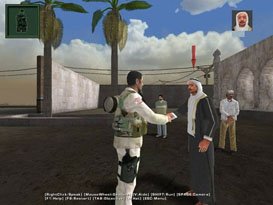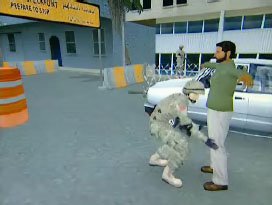Virtual Iraqisby ToastyKen


You've probably heard of Massively Multiplayer Online Games like EverQuest and World of Warcraft. There's also a smaller market for MMOGs that don't center around violence. I interviewed at one such company a couple of years ago, called
There. (Yes, it led to many "Where?" "There." "Where?" "There." jokes. :P) They don't seem to have done as well as
Second Life, possibly because Second Life actually allows users to write their own scripts to introduce new behaviors into the game. (Though I think it's more likely due to the fact that they didn't hire me. ;) j/k )
Anyway, There eventually announced that they got a military contract to adapt their game for military training. This I found really interesting. Eventually, that became the focus of the company, which then changed its name to
Forterra Systems. The old There product languished and eventually spun off into its own company. Forterra has a couple of interesting videos on their site:
Company Video and
Defense Video.
Now, using computer games for military training is nothing new. I think the military's even used modified versions of Quake for training. There are two new things here: (1) many people from all around the world can participate in a single simulation, including off-duty soldiers, and (2) in addition to combat tactics training, their software also has a focus on the non-violent and cultural interaction that are big parts of our deployment in Iraq today.
On that second front, I recently saw this Wired article titled,
Troops Learn to Not Offend. A company called Tactical Language Training, spun off from USC research, is writing computer games to teach soldiers nonverbal cues and cultural taboos. From the article:
Ironically, although the game was developed for the military, it contains no weapons or combat situations. It emulates a civil affairs mission and develops like a multipart story in which soldiers must gain the trust of the people they interact with in order to rebuild communities. "I got a kick out of removing the weapons and replacing them with gestures," Vilhjalmsson says.
I'm glad, too, that the military is spending at least some fraction of its research budget on cutting edge technology that actually tries to reduce violence. :)
In somewhat news, I randomly heard on Live 105 a mention of
mydeathspace.com. " Only three things are certain in life. MySpace, Taxes, and Death. If you have a MySpace account and you die, this is where you will end up." Disturbing!
The directory summarizes reasons for death, and most are because of car accidents, unsurprisingly. The relatedness? There are a few entries where the reason is listed as "Iraq":
Sgt. Akers killed by an IED,
Lance Cpl. Modeen and Sgt. Stevens killed by an IED, and
Sgt. Jakoniuk killed by "Non-Combat Related Injuries". (He was a Blackhawk crewman, so presumably it was some sort of helicopter accident.)
You can click on their pictures to get to their old Myspace profiles. *shudder*



